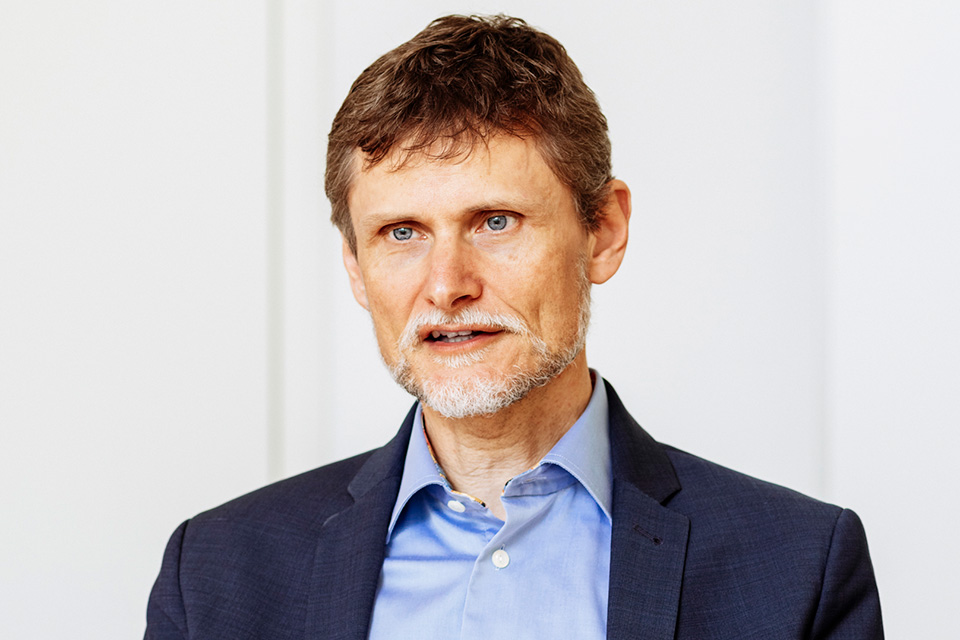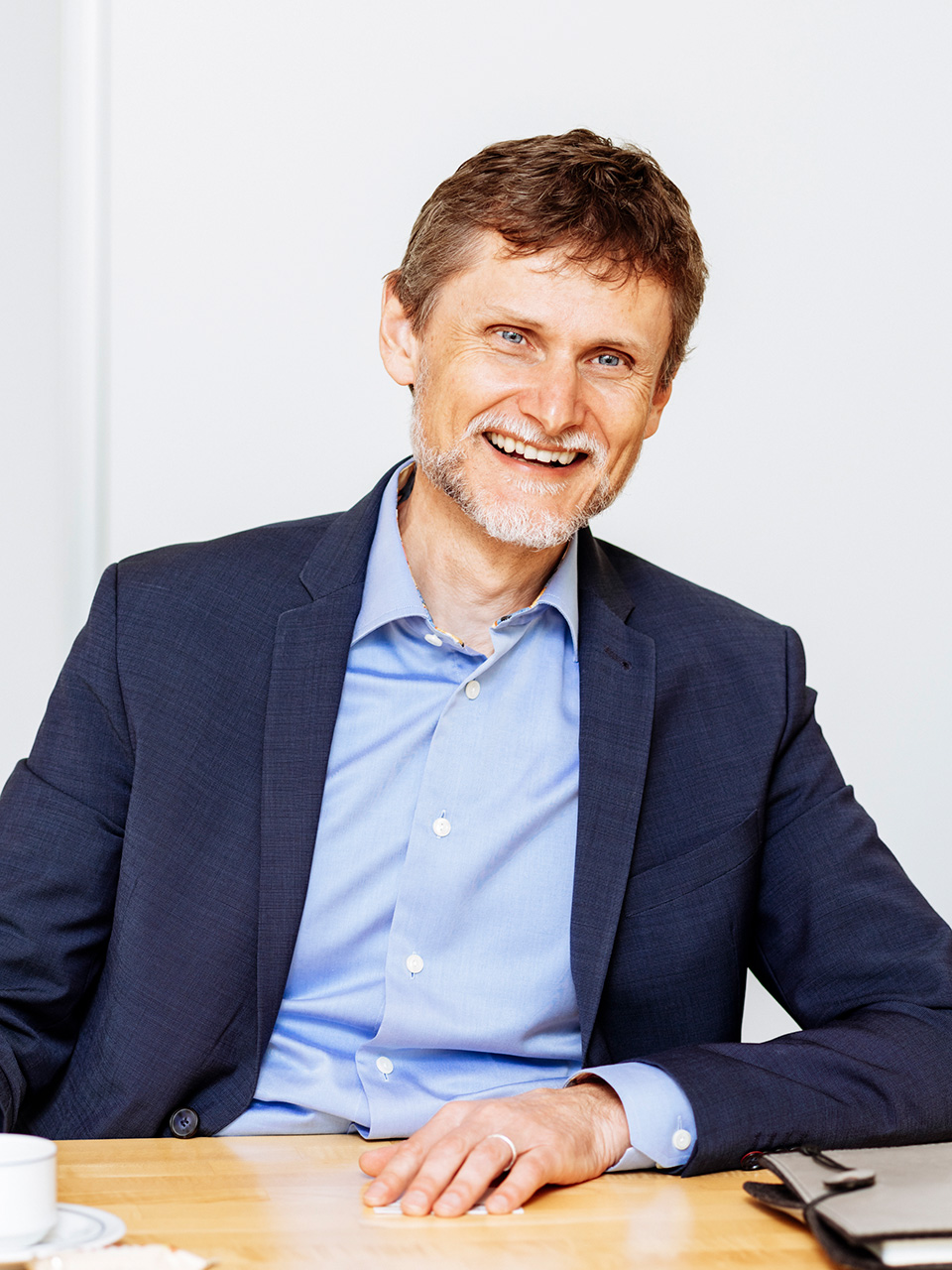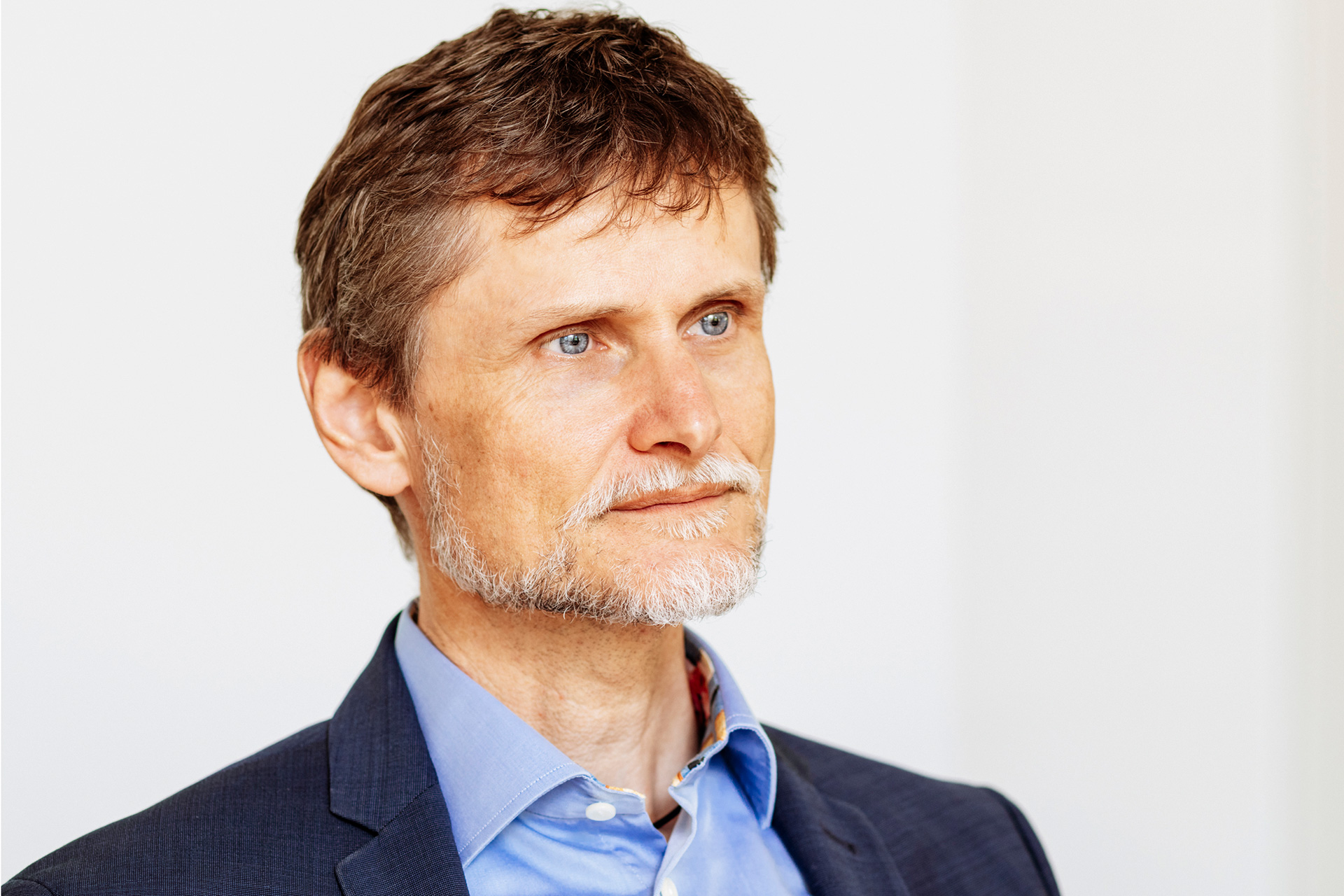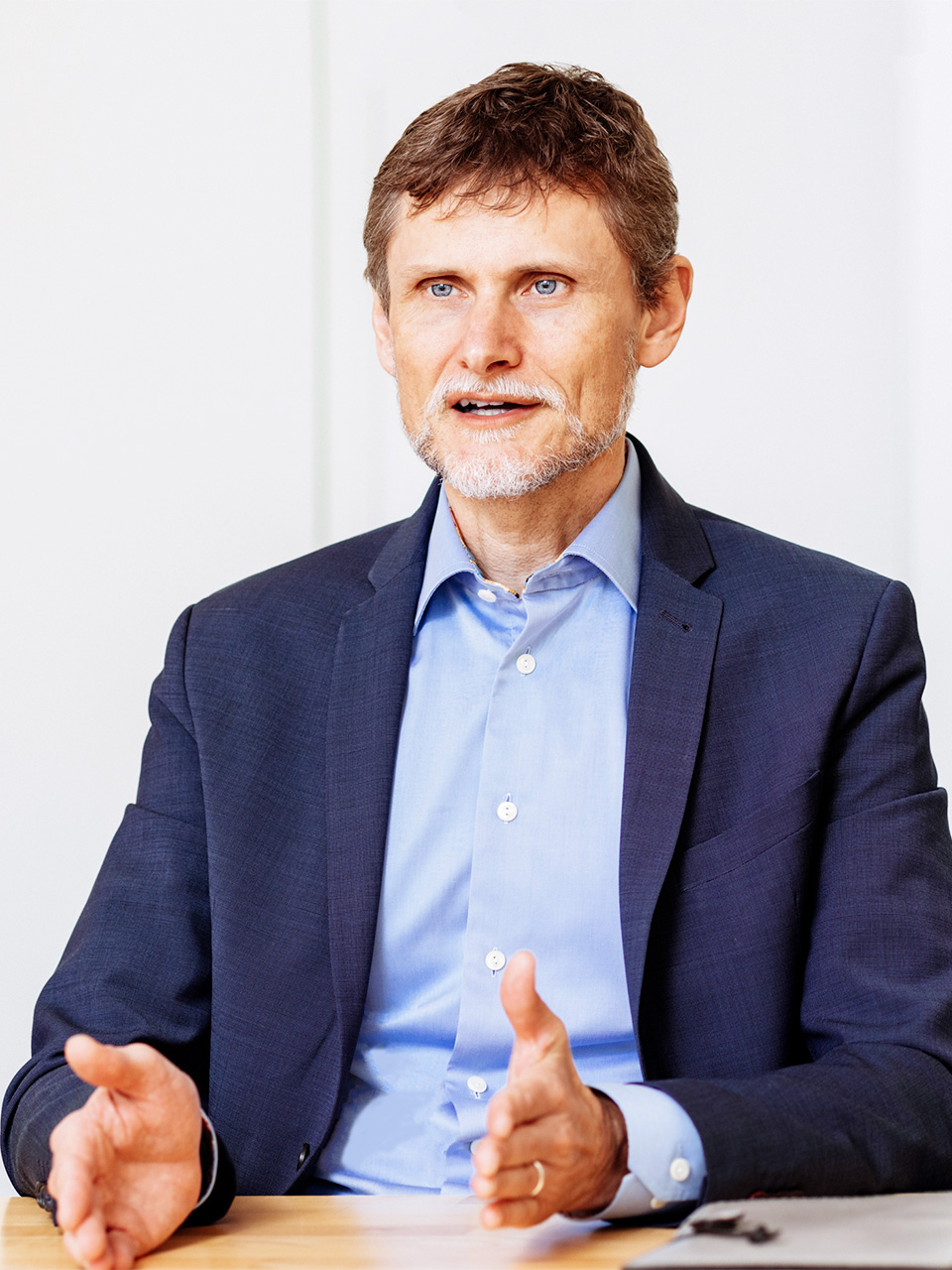Shaping the
INTERVIEW Helmut Angeli
PHOTOS Tina Trumpp
Shaping the
change
INTERVIEW Helmut Angeli
PHOTOS Tina Trumpp

After almost 20 years as Chairman of the Executive Board, Klaus Winkler moved to the Supervisory Board of the HELLER Group at the end of last year. With Reinhold Groß, an experienced manager from the machine tool industry was appointed as his successor to become CEO. On the one hand, he is to guarantee the continuity of corporate culture, on the other hand, his task is to strengthen innovation on all levels and to make the company fit for the coming years. A demanding task.

Before joining HELLER, you worked in various management positions for one of the world’s largest machine tool manufacturers for more than 25 years. What would make a successful and well-liked top manager leave a flagship company and technology leader like Trumpf to join the HELLER Group?
As a preliminary remark, I would like to say that I did not switch directly from Trumpf to HELLER, but first left Trumpf without even talking to another company. Only then, I decided to move into a new direction professionally …
So, what exactly was the reason?
When I joined Trumpf, the company had around 2,500 employees, when I left, there were more than 14,000. In other words, the once medium-sized company had grown into a veritable corporation. This inevitably changes structures and processes and in recent years, I noticed that these side effects were becoming increasingly difficult to reconcile with my ideas. And, to anticipate possible misinterpretations: I continue to have a very good relationship with the Trumpf company and the owner family.
Is it actually a coincidence that, with HELLER, you chose to work for a family-owned company again after leaving the family business Trumpf?
The form of the company was certainly not the main reason; nevertheless, it played an important role. This is because family-owned companies usually strive to build sustainable structures and to develop and secure the company for generations to come. In my opinion, a long-term strategy is the right way to go, especially in a business sector as cyclical as the machine tool industry. This continuity also gives the management the opportunity for once to make decisions that are currently anti-cyclical, but nevertheless wise and correct. For listed companies, as the opposite extreme, the quarterly results provide the compass.

Although sheet metal processing and metal cutting are two different fields, people in the industry all know each other. What was your image of HELLER during your time in Ditzingen?
It was more than an image I had in my mind. There had been repeated contacts with HELLER over the years. For example, when Trumpf’s service division was spun off, we exchanged views with the relevant HELLER managers in Nürtingen, because similar restructuring had taken place there shortly before. So HELLER was no stranger to me. I saw HELLER as a tradition-conscious but at the same time very innovative company.
How much has this impression changed since you joined the company?
Actually, it has rather been confirmed. My impression was and is that HELLER, like Trumpf, is very much driven by engineering. The technical expertise, right down to the last detail, is incredibly high. There is a lot of knowledge and innovative thinking in this company and it is important to put this into effect as quickly as possible. HELLER’s internal motto ‘Fast Forward’ will play an even greater role in implementing the strategy in the future. The accumulated expertise has meant that HELLER is able to offer solutions to challenges that other manufacturers find too complex. HELLER is distinguished by its ability to translate this expertise into productive systems, even in borderline areas.
However positive this extraordinary know-how is in principle, it also involves a risk: even if you are able to do everything, it is not always wise to do everything. A good decision filter is needed to identify which ideas should be implemented. For example, it is about handling the diversity of variants in such a way that allows us to take on all tasks without overstretching the cost structures whilst remaining competitive in terms of price. Conversely, this means that we have to listen carefully to what our customers really need and want, instead of offering everything that is technically possible.
„Basically, it is about giving customers the tools to optimise their own processes.“

Is that meant as slight criticism of your predecessors?
No, it is more of a short description of one of my most urgent tasks as CEO.
You would think that the most urgent task would be to free HELLER from its dependence on the automotive industry. Or what is your view on this?
Partly this is true. Yet, I would like to answer your question more specifically. About half of our orders last year came from the automotive and commercial vehicle segment. Only a quarter were related to the combustion engine. If we look at all topics that are not tied to combustion engines, the share was already over 75 per cent last year. On the one hand, this shows that the market shift is in full swing. On the other hand, however, we must maintain our expertise in the field of combustion engines. Although there will be few investments in new systems, the existing ones, especially in the commercial vehicle sector, will continue to run for another 10 or 20 years. We must be able to plan and carry out the necessary conversions and retrofitting. Regardless of these shares, however, we can usefully apply the knowledge we have acquired in meeting the high standards of the automotive industry to the benefit of customers in many other industries.
How big was the ‘technological’ leap from sheet metal processing to the requirements of metal-cutting manufacturing?
When I decided to join HELLER, I felt that I would have to acquire a lot of knowledge on the market side. I have probably been to more than a thousand sheet metal fabricators in my professional life, but from my very first customer visits, it was clear to me that customers of both applications were struggling with very similar problems. I expressly try to place the markets and the requirements derived from them at the centre of what we do and thus consider myself more of a ‘market person’ and less of a ‘technologist’. Of course, we need the extensive technological knowledge of the experts to translate the tasks of the market into outstanding technologies and products.
Not without reason it is said, “new brooms sweep clean”. Is there a business area here at HELLER to which a new CEO should devote special attention?
I do not want to single out any individual function. Overall, HELLER has mastered the challenges of the past decades well, taking positive steps in important areas, which, however, need to be developed further.
What topics are these?
We are talking about interfaces and data flows, for example. In these regards, the German mechanical engineering industry as a whole still has some catching up to do. All companies are working on this, but due to the heterogeneous situation at the customers, it is a complex task and takes time before it will be fully implemented. Basically, it is about giving customers the tools to optimise their own processes. To do this, we need more data, more transparency, more overarching interpretation and control, and this must be provided by the manufacturer.
You are talking about Industry 4.0?
In principle, yes, but not as a kind of revolution, as it was referred to years ago, but as an evolutionary development. HELLER has been on the right track here for years. In this context, I would just like to mention the HELLER Services Interface, enabling the use of digitised data in a customer-oriented way. It allows us to provide very good process transparency and machine condition parameters. However, we also offer interfaces for further processing of the data in MES systems or the connection of automation systems.
Let’s talk about automation. In the past, you worked in sheet metal processing –a field where comprehensive automation can almost be considered an absolute must. Is there still some catching up to do in metal cutting?
I do not see much difference here. In sheet metal production, there has been some kind of trend in recent years to purchase self-sufficient production cells with automation from only one manufacturer. This eliminates the difficulties involved in having different interface formats from different manufacturers. In principle, however, automation is equally important, regardless of whether cubic workpieces or sheet metal is concerned. Automation is therefore also a key success factor for us. HELLER has already built up a great deal of expertise in this area as well.
The HELLER Group has a global presence, but especially outside Central Europe, i.e. the USA and China, it is very much focused on the needs of the automotive industry. Is that not something that needs to be changed?
What is certainly true is that in the past the organisations were often more than busy dealing with large projects. On the one hand, there are still far more active projects in the automotive and commercial vehicle segments in the USA and China. Therefore, the share of such projects will remain higher. On the other hand, we have also launched initiatives in both markets to penetrate further applications. So far with positive feedback.

„As a rule, a new idea first has to prove itself by being successful on the market.“
Until now, the Nürtingen location has been something like the heart and brain of the entire HELLER Group. Will it stay that way under CEO Reinhold Groß?
Nürtingen was and is the central location of HELLER and will remain so. Of course, the principle of regional customer proximity also applies to HELLER, especially in terms of the sales and service functions. This also includes in-depth local consulting. However, product development, technology expertise, automation and digitisation will remain at a centralised location or under central control. And of course, essential value-added functions such as component production for the entire group in Nürtingen are not being called into question.
Although all forecasts are currently subject to a certain degree of uncertainty in view of the Covid pandemic and the conflict in Ukraine, as HELLER CEO you will probably have set yourself specific sales targets …
… we have planned an order intake of just over 500 million euros for this business year. Based on everything we know now, we will at least achieve this goal and probably even exceed it. In view of the uncertainties mentioned, sales naturally lag behind order intake. In terms of the market, we will be on the right track if we are able to recognise the revenues from the orders we have accepted.
Could new business models not be helpful for staying on the ‘right track’?
There is no question about that. With HELLER4Use, for example, we offer an innovative usage model that has been well received by our customers. My expectation is that such pay-per-use models will enable a significantly higher market penetration in the future. These kinds of ideas in particular, where sales will not sharply increase and which usually need a long start-up phase, are in good hands with family companies, because these models often require a lot of stamina.
The machine tool industry is considered somewhat conservative, especially on the user side. Do you consider such models to be future revenue generators?
Users of machine tools not only have to earn money with the products, but they often take considerable entrepreneurial risks in procurement. Especially smaller companies. Therefore, I fully understand the fact that decisions tend to be made conservatively. As a rule, a new idea first has to prove itself by being successful on the market. That is actually a healthy and sporting challenge. What you have to be prepared for is that the introduction processes for new products or technologies can take a little longer as a result.
Let’s go back to the question of ‘why HELLER’. Probably there would have been alternatives. What was it that ultimately tipped the scales in favour of HELLER?
One statement in particular impressed me in my conversation with the then Chairman of the Supervisory Board, Berndt Heller. My question was what the Chairman of the Supervisory Board and main shareholder expected in terms of the company’s development over the next ten years. His response was: “I actually want my people to do well.” In translation, this still means that we need to be economically successful, that we need growth and good profitability. Nevertheless, it makes a big difference which way around the equation is set up. I am convinced that working in such a corporate culture is worthwhile and brings great pleasure.


